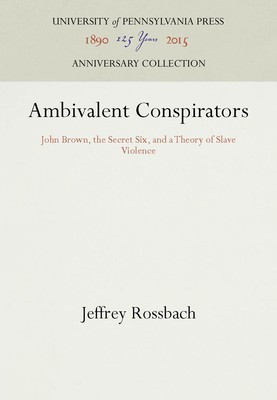
- We will send in 10–14 business days.
- Author: Jeffrey Rossbach
- Publisher: University of Pennsylvania Press Anniversary Collection
- ISBN-10: 0812278593
- ISBN-13: 9780812278590
- Format: 15.6 x 23.4 x 1.9 cm, hardcover
- Language: English
- SAVE -10% with code: EXTRA
Reviews
Description
The remarkable relationship among the six conspirators who aided John Brown in his famed 1859 raid at Harpers Ferry is dramatically exposed in this volume. Why did these six abolitionists, who were nominally pacifist, decide to subsidize an act of black violence? Jeffery Rossbach rejects the commonly held belief that Brown dominated them with his charismatic personality. Here he delves into the backgrounds and beliefs of the members of the Secret Six during their three-year involvement with the plan and gives us, for the first time, a revealing picture of the group's character.
Rossbach identifies the set of racial and political assumptions at the core of the Committee's rationale. He demonstrates how the conspirators, particularly Parker and Higginson, fused their ideas about political violence with those of the Journalist James Redpath and some free black leaders in the north. Essentially, the Six believed that the condition of slavery had rendered the black man docile, pliant, and prone to collective behavior. If slaves rallied to Brown's insurrectionary banner, they reasoned, their violent acts would have a cathartic effect on the Afro-American character and social outlook. The conspirators felt that just as the willingness to fight for freedom formed the basis of the Anglo-American character, so a violent uprising to free slaves and kill white oppressors must serve as the black man's first step toward the assimilation of a new and more individualistic value system. That system would more closely match the one held by the democratic, industrial North. Surpassing previous studies by both conservative and revisionist historians, Rossbach shows how the secret committee's relationship with Brown was based upon their common social assumptions and personal aspirations. He suggests that they shared a system of beliefs that was emerging among urban professionals of the new industrial North. His work provides a fuller dimension to this key episode in American history.EXTRA 10 % discount with code: EXTRA
The promotion ends in 17d.18:29:27
The discount code is valid when purchasing from 10 €. Discounts do not stack.
- Author: Jeffrey Rossbach
- Publisher: University of Pennsylvania Press Anniversary Collection
- ISBN-10: 0812278593
- ISBN-13: 9780812278590
- Format: 15.6 x 23.4 x 1.9 cm, hardcover
- Language: English English
The remarkable relationship among the six conspirators who aided John Brown in his famed 1859 raid at Harpers Ferry is dramatically exposed in this volume. Why did these six abolitionists, who were nominally pacifist, decide to subsidize an act of black violence? Jeffery Rossbach rejects the commonly held belief that Brown dominated them with his charismatic personality. Here he delves into the backgrounds and beliefs of the members of the Secret Six during their three-year involvement with the plan and gives us, for the first time, a revealing picture of the group's character.
Rossbach identifies the set of racial and political assumptions at the core of the Committee's rationale. He demonstrates how the conspirators, particularly Parker and Higginson, fused their ideas about political violence with those of the Journalist James Redpath and some free black leaders in the north. Essentially, the Six believed that the condition of slavery had rendered the black man docile, pliant, and prone to collective behavior. If slaves rallied to Brown's insurrectionary banner, they reasoned, their violent acts would have a cathartic effect on the Afro-American character and social outlook. The conspirators felt that just as the willingness to fight for freedom formed the basis of the Anglo-American character, so a violent uprising to free slaves and kill white oppressors must serve as the black man's first step toward the assimilation of a new and more individualistic value system. That system would more closely match the one held by the democratic, industrial North. Surpassing previous studies by both conservative and revisionist historians, Rossbach shows how the secret committee's relationship with Brown was based upon their common social assumptions and personal aspirations. He suggests that they shared a system of beliefs that was emerging among urban professionals of the new industrial North. His work provides a fuller dimension to this key episode in American history.

Reviews